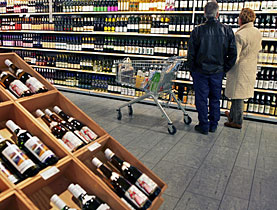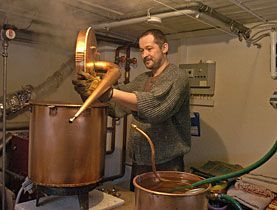Spirited Swiss drinking more but not by much

Higher rates of wines and beer consumption are part of the broader trend of Swiss people drinking more, the Federal Alcohol Board has reported.
The per capita consumption of alcohol in Switzerland was the equivalent of 8.8 litres of pure alcohol in 2007, an increase of 200 millilitres over 2006, authorities said on Monday.
However, consumption between 2004 and 2007 was still significantly lower than 20 years ago.
In 1981, Swiss drank the equivalent of 11 litres of pure alcohol per year on a per capita basis. In 1994, consumption fell under the ten litres per capita level for the first time and in 2004, it dropped to under nine litres per capita.
Authorities say that on average, Swiss took in 39.3 litres of wine, 57.4 litres of beer and 4.0 litres of spirits per capita in 2007. In 2006, the number was 3.6 litres per capita although in 1981, it stood at 5.3 litres per person.
It is the fourth year in a row that alcohol consumption has increased but despite the rising numbers, Switzerland stands in the middle when compared with other countries.
Changing habits
GastroSuisse, an industry association, has attributed the changing habits to increased health awareness, stricter drinking and driving laws, and to broader social attitudes.
“Alcohol is consumed differently today,” said Florian Hew, the organisation’s director. He says consumers in restaurants are increasingly opting for quality.
The report comes amid findings earlier in July from the Swiss Institute for the Prevention of Drug and Alcohol Problems indicating that alcohol and drug abuse – including binge drinking – among young people in Switzerland had fallen over the past four years.
“The risks of problem drinking are better known today,” said spokeswoman Monique Helfer. The group says more focus needs to be placed on prevention, in light of the increase in consumption. It is awaiting data from a national health survey expected to be released in the coming months.
Around 300,000 people in Switzerland are alcoholics or are in danger of becoming addicted, according to the institute.
The statistics released Monday were not intended to shed light on harmful alcohol consumption within individual segments of the population, the Federal Alcohol Board emphasised.
High spirits
The total domestic consumption of spirits was the equivalent to 12,027,200 litres of pure alcohol last year, the Federal Alcohol Board said. In 2006, the number was 11,608,600.
However, consumption of domestically produced spirits fell. Producers in Switzerland made the equivalent of 1,611,000 of pure alcohol in 2006, but in 2007, the number fell to 1,555,100 litres.
Particularly hard hit were producers of kirsch, a Swiss specialty made from black cherries. Consumption fell from the equivalent of 339,500 litres to 188,100 litres.
When it came to imported spirits, whisky won out, with a total equivalent of 1,838,000 litres of pure alcohol consumed. The fastest growing spirit was vodka, with 6.5 per cent growth over 2006.
For the first time, however, Swiss spirit producers exported more than the equivalent of 300,000 litres of pure alcohol. The export of absinthe, legalised in 2005, increased four-fold last year.
swissinfo with agencies
While consumption levels remain significantly lower than in the 1980s and 1990s, the Federal Alcohol Board says that 11 per cent of people over the age of 15 are responsible for one half of the country’s alcohol intake.
Between 2,500 and 3,000 people die each year in Switzerland as a result of alcohol consumption.
A 2003 study by Neuchâtel University counted the social costs of alcohol to be at least SFr6.5 billion ($6.26 billion) annually.
Switzerland taxes spirits at SFr29 per litre of pure alcohol and beer at SFr5.30 per litre of pure alcohol.
Flavoured alcoholic beverages are taxed at SFr116 per litre of pure alcohol. Wine is not taxed.
The age limit for fermented alcohol is 16 and 18 for distilled alcohol. Cantons have the discretion to increase age limits.

In compliance with the JTI standards
More: SWI swissinfo.ch certified by the Journalism Trust Initiative











You can find an overview of ongoing debates with our journalists here . Please join us!
If you want to start a conversation about a topic raised in this article or want to report factual errors, email us at english@swissinfo.ch.